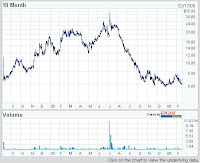
Lakes Entertainment, Inc. (based in Minnesota, of all places!) is the investor and speculator funding the Jamul Indian tribe’s attempts to build a casino just outside the town of Jamul. Lakes Entertainment is a public company, trading under the symbol WPTE. They were delisted from NASDAQ after getting into some trouble with the SEC; they claim to have resolved these issues and are now in the process of being re-listed.
My readers will know that this casino is something I am vehemently opposed to, so we try to follow the news on this issue. The process of getting approval for such a casino is far from transparent — there’s an awful lot about it that’s not only invisible, but unknown. An observer like me gets the impression that the process isn’t even well-defined. This is the perfect setup for corruption, for dirty money to drive the outcome.
Well, Lakes Entertainment just announced their fiscal 2005 results, and they’ve issued a press release about it (the usual practice for a public company). Buried in there is this little gem (emphasis added):
The net unrealized gain on notes receivable was $5.2 million and $3.1 million for 2005 and 2004, respectively, related to the adjustment to fair value of the Company’s notes receivable from Indian tribes. During 2005 the net unrealized gain of $5.2 million included unrealized gains of approximately $11.4 million, which were partially offset by unrealized losses of approximately $6.2 million primarily related to the termination of the agreement with the Kickapoo Traditional Tribe of Texas. The unrealized gains of approximately $11.4 million related primarily to increased probability of opening related to the casino development projects with the Pokagon Band of Potawatomi Indians in New Buffalo, Michigan and with the Jamul Indian Village near San Diego, California.
Read at face value, this says that the company believes its chances of getting the Jamul Casino built have increased so much that they should book some increased value (the “unrealized gains") on their balance sheet. However, as I read this company’s financial report (and look at their stock price), it’s easy to see that they must be desperate for anything resembling good news — so I have to be a bit skeptical of their statement. And its one of those judgment things; there’s no objective criteria that I’m aware of that would let us accurately set a fair value on this.
So I guess I’m not quite sure what to read into this. I am sure that I hate seeing anything that says the casino is more likely to be built!
And I really, really like the trend on the WPTE stock price — let’s hope that continues, right into the ground…

In the old blog, Sara said:
ReplyDeleteHas anyone involved some tough land use attorneys to fight the casino? There seems to be some money in Jamul and how about some costly litigation regarding decreased enjoyment of property (a “taking"), and/or find a rare bug or animal or WETLANDS (hah) that will be destroyed!My interest is I was thinking of relocating/renting in the area, but now Im a bit scared off.
In the old blog, Mike Weber said:
ReplyDeleteActually, Lakes Entertainment trades under LACO - WPTE is a subsidiary of it.Unfortunately, their stock just got a shot in the arm with the settlement of the Shingle Springs mess up in Northern CA.Steven Volker was the attorney for the “Voices for Rural Living” (VRL) a citizen’s group much like our JAC (Jamul Against the Casino). There were differences between the two tribes - the Miwok actually seemed to care enough to try and mitigate the impact the casino was going to have by agreeing to give $192million over 20 years to the Country. The JIV tried to minimize the impact their casino was going to cause by mis-representing facts in their environmental impact study.- Mike